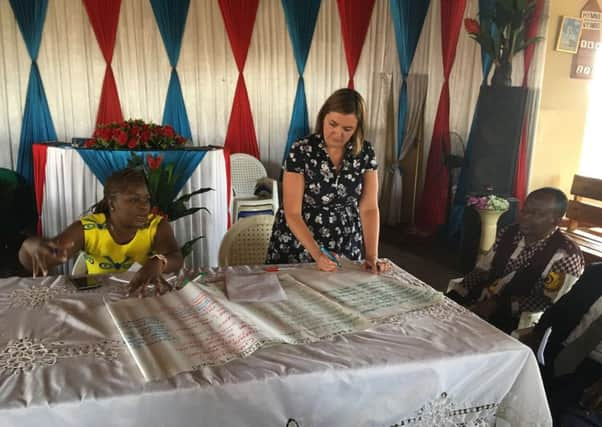Emily Mnyayi: Linking up with schools in Malawi has a lot to teach Scottish kids '“ and theirs


I have just returned from two weeks in Malawi where I was struck by similar viewpoints there. Malawian teachers confided that, although learners appreciated them, they felt the profession wasn’t well respected.
We all remember a teacher who influenced our lives, we know how life-changing the school years are, we entrust schools to guide our children; so why don’t we give teachers the respect they deserve?
Advertisement
Hide AdAdvertisement
Hide AdArriving in Malawi, colleagues and friends are quick to say “feel at home”. I understand why Malawi is famous for the warmth of its people; I have never felt so welcome in a country so far from home.


Despite the warm welcome I feel disappointed that, although the Malawian government has made improvements, not much has changed for the teachers I spent three years working with in 2007. The class sizes still average more than 150, the packed curriculum doesn’t fit into the academic year and paperwork is still piled high.
Working in Scottish schools I see the strain here and, although pressures are different, there are many similarities. Ask a teacher in either country why they stay in a job without the respect it deserves and you get similar answers. They talk of the enjoyment of working with learners, the breakthroughs they have had, the lives changed and the human impact they have seen.
They understand the significance of the early years, feel proud that they can support learners through this impressionable time, and influence future generations.
Despite the challenges teachers face in both countries, I am struck by how quickly schools find similarities through partnerships. We currently support more than 230 Scotland-Malawi school links which are part of a unique nation-to-nation and people-to-people effort stretching back more than 150 years. This bilateral friendship has been significantly re-energised in the last decade, in part by the generation of young Scots and Malawians who have been inspired while at school.


School partnerships are sometimes criticised for being one-sided, or too focused on fundraising. However, the schools I work with are genuinely driven by solidarity, not charity. They plan together, with educational benefits at their core. Mutual understanding and respect are evident.
Led by agreed Partnership Principles, schools can have frank and open discussions about what they want to achieve together. Although each partnership is different, plans often include two-way cultural learning, professional development for teachers, and friendships between staff and learners.
They listen, learn and share information about the challenges faced, helping each other to find the right solutions. They swap curriculums and identify areas of synergy, not to add to workloads, but to enrich existing educational outcomes.
Advertisement
Hide AdAdvertisement
Hide AdI’ve seen the impact successful partnerships have on learners in both countries – the excitement when they receive a letter, photo, video or connect through Skype. The way learning about real people allows them to connect with a subject in a more meaningful way. This is especially important for learners who find school challenging. Correct spelling becomes more significant if your letter is being sent to a friend whose first language isn’t English.
Malawian learners tell me about their friendships, the solidarity they feel as part of the Scotland-Malawi network and the pride they feel in all that Malawi has to offer. Teachers often use school partnerships to challenge stereotypes (on both sides) – supporting learners to consider all aspects of their partner country. Meaningful school partnerships help future generations communicate across language barriers, respect cultural differences and see the shared humanity which unites us. Malawi has a reputation for being a friendly nation, and Scotland for being outward-looking and open. Successful school partnerships leave a living legacy far beyond the classroom.
Seeing these friendships in action during my visit made me realise the potential school partnerships have to bring about real change. Next year I hope World’s Teachers’ Day and school staff across the globe will receive the respect and admiration they deserve.
Emily Mnyayi, head of youth and schools, Scotland Malawi Partnership.